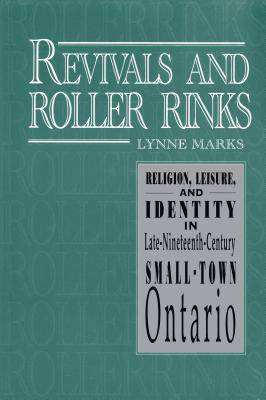
- Afhalen na 1 uur in een winkel met voorraad
- Gratis thuislevering in België vanaf € 30
- Ruim aanbod met 7 miljoen producten
- Afhalen na 1 uur in een winkel met voorraad
- Gratis thuislevering in België vanaf € 30
- Ruim aanbod met 7 miljoen producten
Revivals and Roller Rinks
Religion, Leisure, and Identity in Late-Nineteenth-Century Small-Town Ontario
Lynne MarksOmschrijving
In this examination of the social and cultural meanings of religion and leisure in nineteenth-century small-town Ontario, Lynne Marks looks inside churches, hotel bars, fraternal lodge rooms, and roller-skating rinks to discover the extent to which a particular Protestant value system and lifestyle dominated small towns of the period. In assessing the extent of Protestant cultural influence, Marks also illuminates the nature of social relations and group identity, particularly with regard to gender, class, religion, age, and marital status.
Based primarily on a study of the towns of Thorold, Campbellford, and Ingersoll - communities situated in different areas of southern Ontario and differing significantly in economic and occupational structure and in religious composition - this investigation seeks as well to determine the nature of commonalities and differences in patterns of participation in religious and leisure activities within both middle- and working-class families. To further examine working-class values and beliefs, Marks moves beyond the local level to explore two popular working-class movements of the 1880s, the Knights of Labor and the Salvation Army, providing insights into the complexities of class and gender identity among working-class women and men and shedding light on the nature and meaning of working-class religious beliefs and practices.
Specificaties
Betrokkenen
- Auteur(s):
- Uitgeverij:
Inhoud
- Aantal bladzijden:
- 330
- Taal:
- Engels
- Reeks:
- Reeksnummer:
- nr. 5
Eigenschappen
- Productcode (EAN):
- 9780802078001
- Verschijningsdatum:
- 23/09/1997
- Uitvoering:
- Paperback
- Formaat:
- Trade paperback (VS)
- Afmetingen:
- 152 mm x 229 mm
- Gewicht:
- 521 g

Alleen bij Standaard Boekhandel
Beoordelingen
We publiceren alleen reviews die voldoen aan de voorwaarden voor reviews. Bekijk onze voorwaarden voor reviews.









